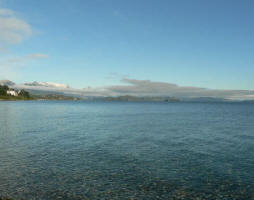- Regional water observation mechanism
- Regional Cooperation Assessment
- Water Quality Monitoring (JP)
- Water scarcity and drought (JP)
- Groundwater (JP)
- Waste water reuse (JP)
- Shared Water Resources Management (JP)
- Linking rural development and water management (JP)
- Waste management
- Water institutions
- Climate Change
- Floods
- Desalination
- Right to Water
- Irrigation
- Satellite data
- Water reports & data
- Hydrology
- Sanitation
- Gender and IWRM
- ArabWAYS
- Non-Revenue Water
- Virtual Water & Water Footprint
- WANA Water Panel
- Water Demand
- Water Governance
- Water Pricing
- Water accounts
- Water nexus Energy
- Geosciences
- Rural Management
 UN Human Rights Council moves forward on the right to water and sanitation
UN Human Rights Council moves forward on the right to water and sanitation
On 28 February 2008, the UN Human Rights Council, the primary United Nations
body for human rights issues adopted by consensus a resolution on 'Human
Rights and access to safe drinking water and sanitation.' Through this
resolution, the Council established a new 'Independent Expert on the issue
of human rights obligations related to access to safe drinking water and
sanitation.' The Independent Expert will work for 3 years on two primary
tasks. First, to identify, promote and exchange on best practices related to
access to safe drinking water and sanitation, and, in that regard, to
prepare a compendium of best practices; and second, to carry out further
clarification of the content of human rights obligations, including
non-discrimination obligations, in relation to access to safe drinking water
and sanitation.
The Human Rights Council also made an important legal statement:
"Emphasizing that international human rights law instruments, including the
Covenant on Economic, Social and Cultural Rights, the International
Convention on the Elimination of All Forms of Discrimination against Women
and the Convention on the Right of the Child, entail obligations in relation
to access to safe drinking water and sanitation." This statement clearly
indicates that all governments are bound by human rights obligations to
ensure access to safe drinking water and sanitation for all. The resolution
is available at www.cohre.org/water (>New Developments) or from the
web-site of the Office
<http://ap.ohchr.org/documents/E/HRC/resolutions/A_HRC_7_L_16.doc>
of the High Commissioner for Human rights.
The resolution was not as strong as it might have been, as it did not
explicitly refer to the 'right to water and sanitation.' This is more
relevant as a political rather than legal matter, since human rights
obligations of governments to ensure access to water and sanitation imply a
corresponding right of individuals to water and sanitation. In informal
sessions on this resolution attended by government and NGOs, Canada and the
United States requested removal of explicit references to the right to water
and sanitation. The United Kingdom expressed its support for the right to
water, but stated that it did not recognise the right to sanitation. A
number of other countries expressed concerns with the particular formulation
used to describe the right, but did not request its removal. Given that only
one country - Canada - has thus far voted against references to the right to
water and sanitation, it is likely that a resolution containing explicit
references to the right to water and sanitation would have been adopted by
the Council with a strong majority in favour. However, in order to maintain
consensus, the sponsors of the resolution decided not to include references
to the 'right to water and sanitation' in the resolution.
It is unfortunate that a small number of States are attempting to move away
from previous statements in which they had recognised access to water and
sanitation as a right. At two UN world conferences, the International
Conference on Population and Development, Cairo, 1994 (in which 177 States
participated) and the Second United Nations Conference on Human Settlements
(Habitat II), Istanbul, 1996 (in which 171 States participated), the
community of States - including Canada, the United States of America, the
United Kingdom - unanimously adopted international declarations which stated
that the right to an adequate standard of living includes water and
sanitation, in addition to food, clothing and housing. The Mar del Plata
Declaration of the UN Water Conference, 1977 also recognised the right to
water. The 118 members of the Non-Aligned Movement and the 43 members of the
Council of the Europe recognised the right to water respectively in 2006 and
2001. The Asia-Pacific Water Forum, composed of 37 Asian countries
recognised the right to drinking water and sanitation in 2007. (For more
information see the COHRE position paper: 'The Human Right to Water and
Sanitation: Legal basis, Practical Rationale and Definition' available at
www.cohre.org/water > Resources and Articles).
Although the Council did not proceed as far as it could have, its creation
of an Independent Expert mechanism and clear recognition of human rights
obligations relating to water and sanitation are important
breakthroughs.
The resolution firmly places the right to water and sanitation on the
Council agenda. The sponsors and the more than 40 co-sponsors of the
resolution should be congratulated for their contributions to the success of
this important initiative.
The Council will address this topic again at its 10th session in 2009.
Several human rights and development NGOs will be advocating for the UN
Human Rights Council to explicitly refer to the 'right to water and
sanitation' as a right contained within the International Covenant on
Economic, Social and Cultural Rights. It will be necessary to engage with
governments in order to allay their concerns about the implications of the
right to water and sanitation (see for example, a response to the Canadian
government's position on the right to water and sanitation, available at
www.cohre.org/water > New Developments).
COHRE and the Ecumenical Water Network will also establish a distribution
list to keep interested NGOs, academics and national human rights
institutions informed of progress on this Council initiative. Messages will
be limited to once or twice a month, and weekly during the Human Rights
Council sessions. If you would like to be added to this distribution list,
please send a message to Maike Gorsboth (mgo@wcc-coe.org), indicating your
name, organisation and country.
| Contact information |
Ashfaq Khalfan, Coordinator, Right to Water Programme, Centre on Housing Rights and Evictions (COHRE)
(email: ashfaq@cohre.org) |
|---|---|
| News type | Inbrief |
| File link |
http://www.cohre.org/water |
| Source of information | Centre on Housing Rights and Evictions (COHRE) |
| Keyword(s) | right to water and sanitation |
| Subject(s) | DRINKING WATER , DRINKING WATER AND SANITATION : COMMON PROCESSES OF PURIFICATION AND TREATMENT , RIGHT , SANITATION -STRICT PURIFICATION PROCESSES |
| Geographical coverage | International |
| News date | 31/03/2008 |
| Working language(s) | ENGLISH |
 you are not logged in
you are not logged in





